The Rediff US Special/ Nirshan Perera
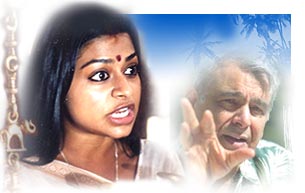

Exclusive! A chat with Ayesha Dharker on the sets of
The Mystic Masseur in Trinidad.
Ismail Merchant's The Mystic Masseur has been filming on location in Trinidad for the past month-and-a-half. After receiving an invitation to visit the set, Assistant Editor Nirshan Perera jumped a plane to the West Indies before his editor could react. This feature is part of a series from the front lines of the emerging movie.
So I've been going from one place to the next," Ayesha Dharker breaks off in mid-sentence and instantly defuses the rising frustration of her interviewer with a dazzling smile.
For the thousandth time today, a clapboard clicks shut and one shrill sentence cuts through Trinidad's dreamy heat, willing even the birds to silence.
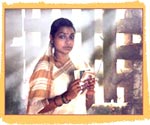 "Quiet on the set. Action!"
"Quiet on the set. Action!"
Just beyond the parlor where we are sitting, the voices of actors Aasif Mandvi and Jimi Mistry curl up to be caught by dangling sound mikes. Five feet away, Ismail Merchant is hunched over an 8-inch television, carefully orchestrating the rolling camera's eye.
But even in the midst of a frantic movie set, trapped between a demanding time schedule and a nosy journalist, Dharker is a pool of quiet composure. It's easy to see why she's the budding darling of the movie industry, having used her sensational performance in Santosh Sivan's The Terrorist to snag a small but coveted role in Star Wars: Episode II.
Late tonight, after she wraps up her final scene in Masseur, she's off to London where she will lend an ear to several other projects dueling for her attention
"I am sorry there's nowhere else to do this," Dharker whispers conspiratorially. The soulful eyes that ensnared actor John Malkovich, prompting him to write about The Terrorist for The New York Times and then help distribute the movie, roll in mock impatience.
"Of course I'm sad to be leaving," she resumes on cue when the word "Cut" unfreezes us. "My time in Trinidad has been fabulous. But, touch on wood, work has been pouring through the roof lately."
The numerous weeks she has spent on this Caribbean island have been blissful, reuniting her with old friend Om Puri and role model Zohra Segal.
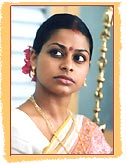 Dharker stars in Masseur, set for release this October, as Leela, the sharp-tongued yet indefatigably faithful wife of mystic masseur Ganesh Ramsumair, played by Mandvi. Based on Sir V S Naipaul's first novel, the movie is rooted in Trinidad's Indian community of the 1950s. Marked by humor and warmth, the novel follows Ganesh's rags to riches rise, from struggling school teacher to mystic masseur to political prophet.
Dharker stars in Masseur, set for release this October, as Leela, the sharp-tongued yet indefatigably faithful wife of mystic masseur Ganesh Ramsumair, played by Mandvi. Based on Sir V S Naipaul's first novel, the movie is rooted in Trinidad's Indian community of the 1950s. Marked by humor and warmth, the novel follows Ganesh's rags to riches rise, from struggling school teacher to mystic masseur to political prophet.
When Merchant approached her with the project a year ago, Dharker felt an instant connection to Leela.
"A character has to jump off the page and makes sense the first time I read it," she explains. "At first glance, Leela comes off as not having an identity of her own. She's completely besotted by her husband. But eventually all these different layers come out. After she marries Ganesh, she realizes that the thing she fell in love with -- his love of literature and his dreams -- are standing in the way of her ever getting to know him. She will always be second best to the books he is writing in a corner."
Initially, Dharker thought the most difficult part of playing Leela would be learning the sing-song Caribbean accent. Merchant's movie is ripe with the spicy pidgin English of Trinidad and voice coaches had to help the actors perfect their patois.
Dharker, for instance, befriended a native Trinidadian actress in London and listened to hours of recordings to get her lines down pat.
"To get the feeling and the rhythm of the way they speak, you have to realize things are at a much higher register," she explains. "They're not like Indians when they speak. It's more lyrical, it's more emotional, it's bigger than life.
"They go, 'Eh, eh!'" Dharker says, arching her eyebrows and craning her neck in a motion of animated surprise. "'What you sayin' girl?'"
"It feels bigger than real life but it isn't because it's totally honest," she continues. "It just has that little bit of spice to it, like talking through a coconut."
In the end, she says, the hardest part of playing Leela was remembering the relationship dynamics of the 1950s and staying within those boundaries.
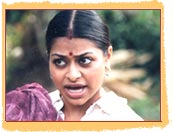 "Nowadays we see marriage as a working relationship, a kind of collaboration between two people," Dharker notes. "But in those days, when you got married you were almost like separate capsules. I had to constantly remind myself that this wasn't a modern relationship and function from that level."
"Nowadays we see marriage as a working relationship, a kind of collaboration between two people," Dharker notes. "But in those days, when you got married you were almost like separate capsules. I had to constantly remind myself that this wasn't a modern relationship and function from that level."
Her performance was constantly buoyed by a renewed friendship with cinema giant Om Puri, who plays the part of Leela's conniving father, the shopkeeper Ramlogan.
Nine years ago the duo played another father and daughter pair in Roland Joffe's 1992 film City of Joy, starring Patrick Swayze. In fact, when Puri first met Dharker on the set of Masseur, he deftly used this coincidence as grist for a gentle ribbing.
"He fumed: 'I thought I got you married, got you off my hands, ran around Calcutta with a rickshaw for your dowry, and here you are again!' " Dharker recalls, laughing. "So he was like, 'Next time you are going to get me married!' "
"He's wonderful," she continues. "He's got this terrific sense of humor. When we worked on City of Joy I would sit around with him and watch everyone else. And he would watch them with me and take their technique apart. He would say so-and-so is a method actor, this is his technique, this is his approach. So-and-so does this, so-and-so does that. And it was really interesting because Om is such a refined composite of different things in his acting. It was like a mini film school for me."
"What I particularly admire about Om is that he can do things with technique -- he can do things with his body and his voice -- but he never loses that core of sincerity underneath," Dharker says. "And he also does something else that I really admire: He never projects his own identity into the character to make it feel sad, happy. He lets the character speak for itself."
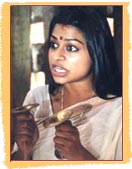 On the set of Masseur Dharker also benefited from the wisdom of Zohra Sehgal. The 88-year-old acting legend played the part of Ganesh's larger than life Auntie.
On the set of Masseur Dharker also benefited from the wisdom of Zohra Sehgal. The 88-year-old acting legend played the part of Ganesh's larger than life Auntie.
"She's a revelation," Dharker raves. "If you ever, ever get the chance to spend even half an hour with her, it will change your life. She's one of those people who's totally fearless, very opinionated, very funny, very genuine. She's like a 25 year old in a 88-year-old's body."
Given the tight budget, Masseur forced many cast members to bunk together in rented bungalows and Dharker was lucky enough to be paired with Sehgal.
"I don't know if I'll get in trouble for saying this, but that, to me, has to be the most valuable experience of this film," she says. "How often do you get to live with an actor like that?"
Sehgal constantly impressed her with the immense energy and discipline that belies her fragile appearance.
"She has this routine," Dharker says. "She wakes up in the morning and exercises for like an hour. Then she'd have things she called recitations, where she'd recite poems and plays to project her voice and cycle them around each day. She's just amazing."
Of course, Dharker also values her experience with Merchant immensely.
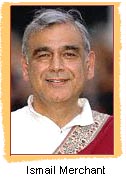 "I've known Ismail since I was a little kid. He was good friends with my dad (columnist Anil Dharker), so I've heard all these stories -- some good, some bad," she jokes, rolling her eyes in amusement. "Not bad, really, but he does have this sort of bad-boy image."
"I've known Ismail since I was a little kid. He was good friends with my dad (columnist Anil Dharker), so I've heard all these stories -- some good, some bad," she jokes, rolling her eyes in amusement. "Not bad, really, but he does have this sort of bad-boy image."
"I came into this thinking, 'Oh my God, what have I got myself into?' " she continues. "But I was really amazed at how he was on the set. Even if he loses his temper, he gets it back so quickly. And I really understand how his charm and charisma have carried him this far. He can get anyone to do anything -- I really believe that now. I think the most important thing is knowing what you want, and Ismail knows what he wants."
From her vantage point, Dharker even sees an intimate connection between the mystic masseur and the mystic Merchant.
"This is almost like an epic story about this one man," she muses. "His rise from very humble beginnings, having the understanding that he was meant for something much bigger. In that whole thing, I think there is a connection to Ismail himself. His power is his charm. He's not like any other director I've worked with."
Eerily on cue, the subject of our conversation interrupts us just then to repay a small loan.
"Every interview I give her money," Merchant deadpans, handing Dharker a wad of colorful bills. "She demands it. I have to find a subtle way of doing it, otherwise my life is hell!"
He beats a quick retreat before Dharker bursts into laughter.
"As you can see, he's a showman, but that doesn't mean he's difficult in any way," she says.
Ayesha Dharker's photographs: Parvena Hafizka. Design: Lynette Menezes
RECENT SPECIALS:
The Thinking Man's Economist
For Laughing Out Loud
The frog-in-the-well syndrome
Visionary Zeal
The Fossil Fanatic
There is life after dotcom death
Washington Chalo!
Lessons from Long Island
Back to top
Tell us what you think of this feature